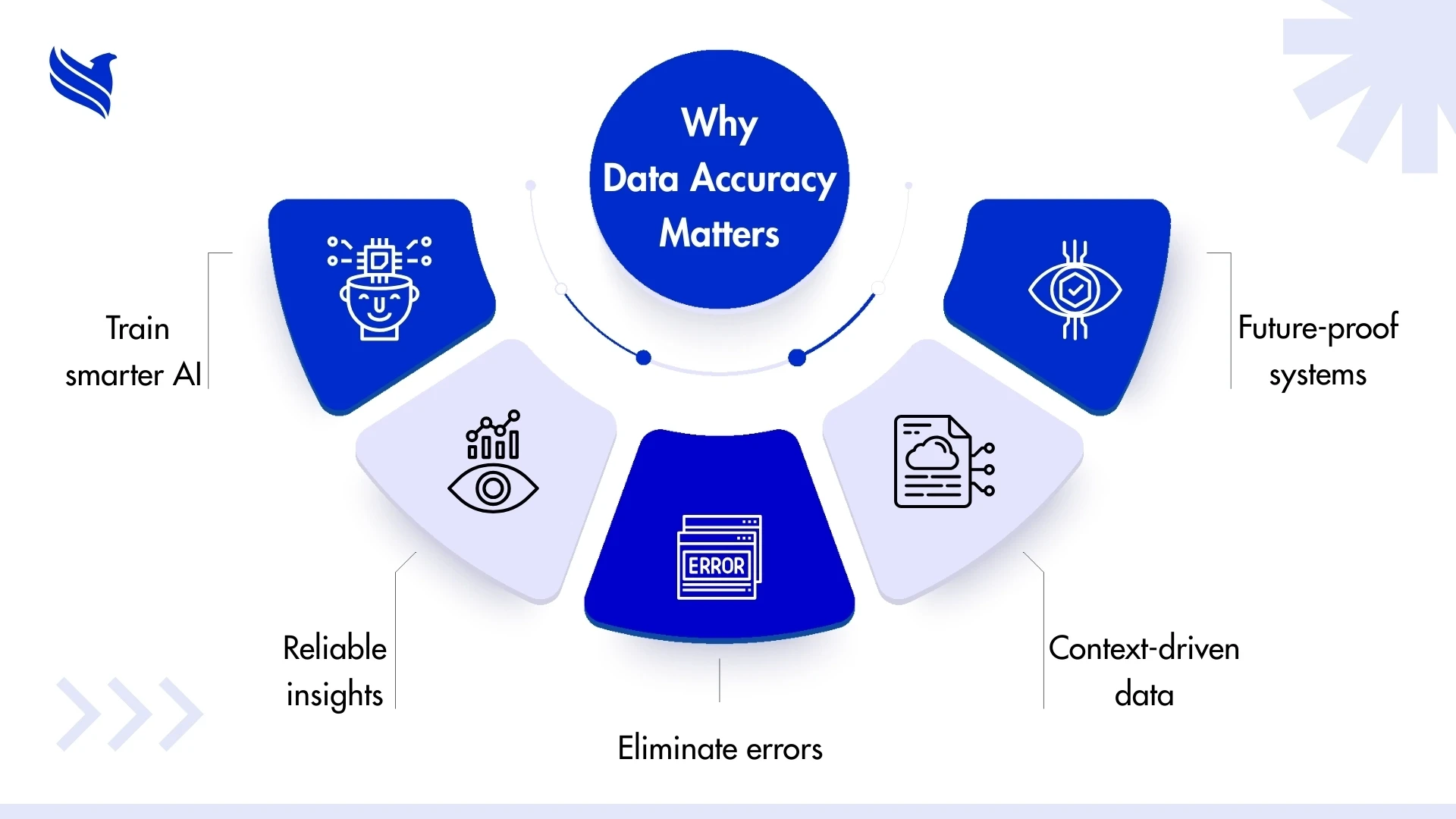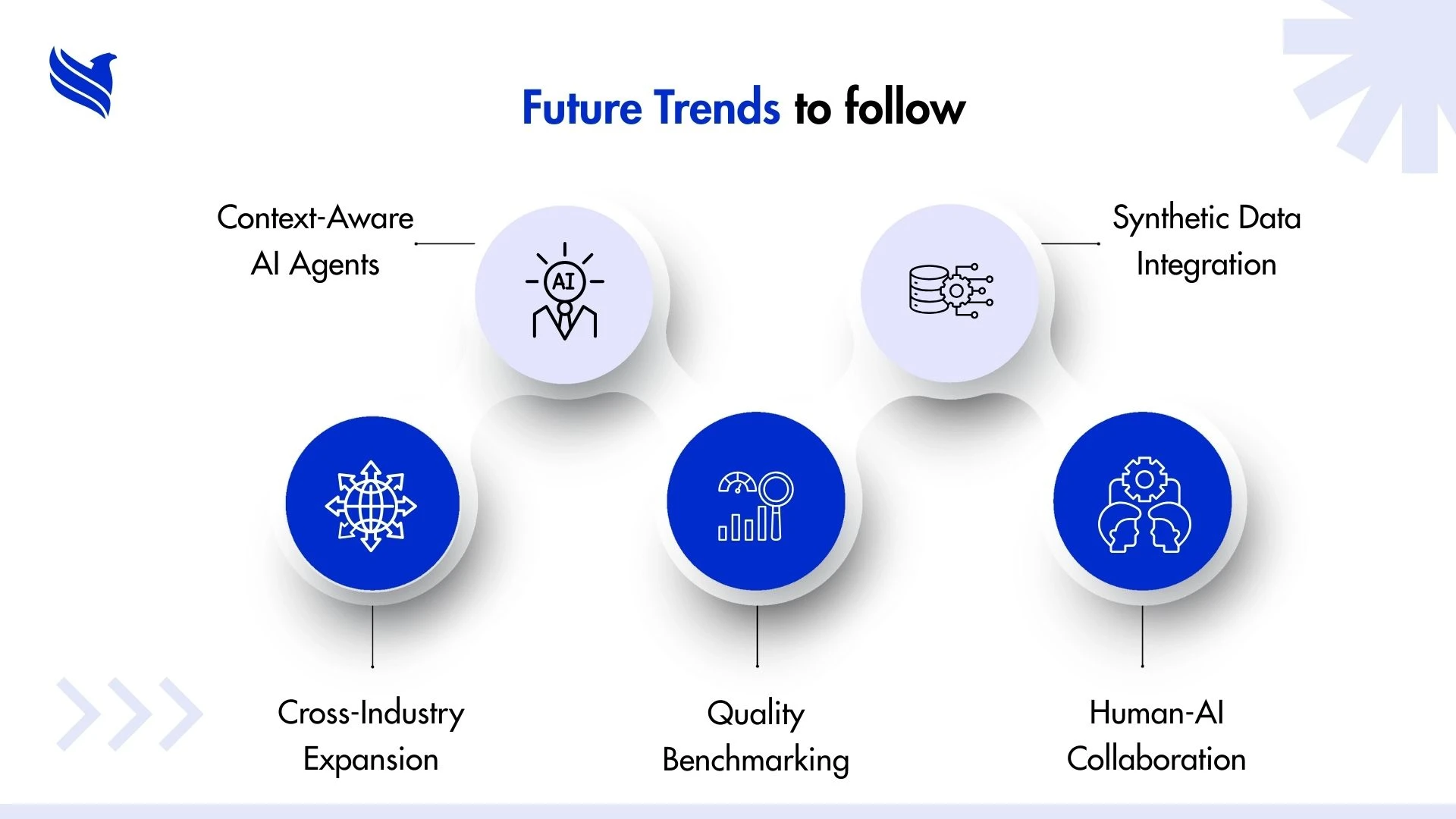Discover how AI agents are transforming data annotation and labeling, boosting accuracy, reducing costs, and redefining workflow and why this shift matters for the future of AI success.
- The complexities undermining effective data annotation
- The business advantages of AI-enhanced labeling
- AI agents: The new force in data annotation & labeling
- Best practices for data labeling in the AI era
- Emerging trends shaping the future of data annotation
- Outsourcing as a strategic advantage in data labeling
- Conclusion: Building tomorrow’s AI on accurate data
An AI system can look brilliant on paper, but if the predictions wobble, what’s the point? It doesn’t matter how many models are built or how flashy the tech sounds; garbage data in, garbage out. That’s the hard reality. Accuracy either makes the model valuable or turns it into another failed experiment collecting dust.
Raw data isn’t enough. It never is. Before a model learns anything useful, that data has to be sorted, tagged, structured, turned into something a machine can actually understand. That’s what data annotation services exist for. Yet the job has always been messy. Labeling thousands of images or chunks of text by hand isn’t just slow; it could be frustrating. And fatigue invites mistakes. Enough of them, and the whole system’s reliability crumbles.
When you look around, teams are overwhelmed. Spreadsheets stacked on spreadsheets. Inconsistent categories. A project that should be accelerating ends up dragging. And while the pressure to scale grows, so does the risk of letting sloppy data slip through.
This is why companies are leaning hard into something different. Not to throw people out of the loop but to make the grind bearable. AI data annotation and AI data labeling agents pre-label at scale, catch patterns faster, and hand over only the edge cases where human judgment is still king. It’s not a clean replacement, it’s a recalibration; machines handle the grunt work, people handle the nuance.
In this blog, we’ll explore the future of data annotation, the rise of AI agents, and how outsourcing can help organizations keep data accuracy at the heart of their AI strategies.
The complexities undermining effective data annotation
While everyone talks about the promise of AI, fewer acknowledge the very real bottlenecks in preparing data. The biggest challenges include: Scale vs. Precision Conflict; training models requires millions of labeled data points, yet even small annotation errors can cripple model outcomes.
- Complexity of Datasets – From medical images to autonomous driving footage, labeling isn’t as simple as tagging objects. Some tasks demand contextual understanding or expert input.
- Inconsistent Quality Control – Hand ten annotators the same dataset and you’ll get ten versions of the truth. Without a unified process, the results drift, and consistency vanishes.
- Resource-Intensive Work – Manual labeling drags. It eats time, money, and focus. Fatigue creeps in, mistakes multiply, and what should’ve been precise ends up sloppy.
- Shifting Demands – AI doesn’t stand still. As models get smarter, the type of training data they demand keeps changing. Static annotation workflows can’t keep up; they break under the weight.\
These issues show why businesses can’t rely on outdated systems. Without adaptation, they risk building AI models on shaky foundations.
The business advantages of AI-enhanced labeling
Here’s the bright side: introducing automated data labeling and AI-driven approaches is solving many of these challenges. Some of the most notable benefits include:
- Speed at Scale – AI agents can pre-label vast datasets in seconds, dramatically cutting down manual effort.
- Higher AI model accuracy – By reducing human error and applying consistent rules, AI agents deliver cleaner, more reliable data inputs.
- Adaptive Workflows – Unlike static systems, AI annotation tools learn from corrections, constantly refining their outputs.
- Cost Efficiency – Automated systems lower the cost-per-label, making high-quality annotation accessible for more industries.
- Reduced Human Fatigue – Humans focus on exceptions and edge cases rather than repetitive tasks.
For businesses, this balance of human insight and AI speed is the sweet spot.
AI agents: The new force in data annotation & labeling
So, what exactly are these AI agents reshaping annotation? Think of them as collaborative assistants embedded into the data annotation workflows. They:
- Pre-label datasets with high accuracy before human review.
- Flag anomalies or uncertain cases where human intelligence is critical.
- Learn continuously, the more corrections they process, the better they become.
- Integrate into services offered by top data annotation and labeling services providers.
The aim was never to cut people out. What’s actually taking shape is a back-and-forth where machines handle speed and humans handle sense. That blend is slowly becoming the standard in data annotation. Look at self-driving tech, AI can tear through road sign labels in bulk, but the odd cases still land with people. Heavy rain, odd shadows, strange debris on the road, those calls aren’t something an algorithm nails every time.
The role of human intelligence in data annotation underscores that AI will not replace people but complement them; machines drive scale, while humans provide essential context. Together, they form a balanced model where accuracy and judgment go hand in hand.
Best practices for data labeling in the AI era
As the industry matures, successful organizations are adopting specific practices to ensure they don’t just ride the AI wave but maximize its potential. Some of the best practices include:
- Start Small, Scale Fast – Begin with limited datasets, validate AI agent performance, then scale up to full production.
- Human-in-the-Loop Verification – Even with AI data labeling, always keep humans in the review cycle to guarantee contextual accuracy.
- Standardized Guidelines – Establish annotation protocols so both humans and AI agents follow the same playbook.
- Audit Regularly – Build feedback loops to continuously test and improve label quality.
- Choose the Right Partner – Whether building in-house or considering data annotation outsourcing, partner choice can make or break results.
These practices help avoid over-reliance on either AI or humans, instead leveraging both strengths.
Emerging trends shaping the future of data annotation
The future of data annotation isn’t just about speed, it’s about creating smarter, more adaptable ecosystems. Some emerging trends include:
- Context-Aware AI Agents – Next-gen annotation agents will understand nuance, not just labels, allowing for more sophisticated categorization.
- Cross-Industry Expansion – From agriculture to legal tech, more industries are turning to data annotation support for specialized use cases.
- Synthetic Data Integration – AI will generate its own synthetic datasets to fill annotation gaps.
- Quality Benchmarking – Accuracy scores and validation metrics will be standardized across data annotation services providers.
- Human-AI Collaboration Models – Expect workflows where AI automates 80% of tasks, leaving the nuanced 20% to skilled annotators.
And as AI systems rely more heavily on data accuracy, it becomes crucial to understand how accurate annotations directly shape AI performance.
Outsourcing as a strategic advantage in data labeling
Not every company can build internal teams of skilled annotators, nor can they afford custom AI annotation platforms. That’s why data annotation outsourcing has gained traction. Trusted outsourcing partners bring:
- Specialized Expertise – Teams trained to handle tricky domains, whether it’s patient records, financial data, or retail product tags.
- Cost Savings – Cutting back on labor and setup costs that in-house teams usually carry.
- Scalability – The freedom to scale projects up fast or slow them down without the usual bottlenecks.
- Advanced Tools – Direct access to AI-powered annotation platforms, minus the heavy upfront spend.
- Global Talent – Outsourcing partners operate across time zones, enabling 24/7 progress.
For many, outsourcing annotation isn’t just about cost, it’s about unlocking faster model deployment without compromising quality. With resources like a complete data annotation guide, companies can also better understand how to evaluate service providers before partnering.
Conclusion: Building tomorrow’s AI on accurate data
Smarter AI won’t come from bigger promises, it’ll come from better data. That part is non-negotiable. High-quality annotation sits at the core, and it always will. The shift happening now, AI agents cutting through repetitive tasks, clearing bottlenecks, pushing speed and scale into old workflows, changes the game. But let’s be honest, machines don’t carry the full weight. When context gets messy, when decisions need a human eye, expertise still matters.
The companies that get this balance right, automation for the heavy lifting, people for the nuance, are the ones setting themselves up for what’s next. Watch the data annotation trends, use best practices that actually stick, and don’t hesitate to lean on data annotation outsourcing when the load gets too big. The next wave of breakthroughs will come from collaboration, not replacement. Human and AI, side by side.
That’s the approach we’ve built at FBSPL. Our data annotation and labeling services pull the best from both worlds: the precision of trained annotators and the efficiency of AI-driven systems. The result? Models trained on data you can actually trust. If building future-ready AI is on your radar, it starts here. Talk to FBSPL today.







